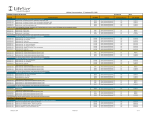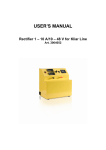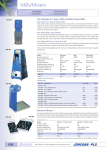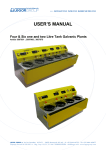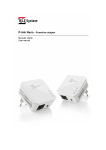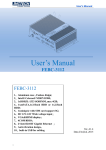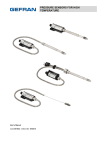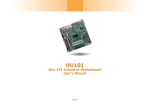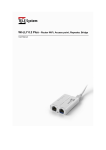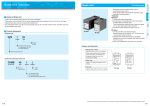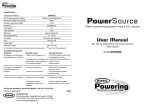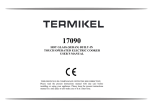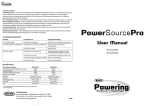Download INSTRUCTION MANUAL - Products
Transcript
INSTRUCTION MANUAL DIGITAL MULTIFUNCTION RECTIFIER 3004038 Dichiarazione CE di Conformità CE Conformity Declaration TIPO DELLA MACCHINA: RADDRIZZATORE MULTIFUNZIONE PRODUCT TYPE: MULTIFUNCTION RECTIFIER Modello/ Model 3004038 Matricola/ Serial Number: Anno di costruzione/ Manufacture year Il sottoscritto Gianni Poliero Legale rappresentante dell azienda LEGOR GROUP S.p.A. DICHIARA The undersigned Gianni Poliero, legal representative of LEGOR GROUP S.p.A. DECLARES sotto la sua esclusiva responsabilità, che la macchina, a cui la presente dichiarazione si riferisce, è conforme alle prescrizioni delle: under his sole responsibility that the machine, to which this declaration relates, conforms to following standards: - 2006/95/CE, Direttiva Bassa tensione - Directive 2006/95/EC, on Low voltage equipment Bressanvido (Vicenza), LEGOR GROUP Srl Legale Rappresentante / Legal Representative 2 Table of contents: 1. General description of the multifunction electronic rectifier 2. Work stations and commands 3. Safety protections and precautions 4. Main technical specifications of the multifunction electronic rectifier 5. Use of the multifunction electronic rectifier 6. Handling and transportation of the multifunction electronic rectifier 7. Installation of the multifunction electronic rectifier 8. Assembly/disassembly of the multifunction electronic rectifier 9. Preparation of the multifunction electronic rectifier 10. Start-up of the multifunction electronic rectifier 11. Maintenance and repair 12. Enclosed technical documenation 3 CHAPTER 1 GENERAL DESCRIPTION OF THE MULTIFUNCTION ELECTRONIC RECTIFIER 1.1 OPERATING PRINCIPLES and MAIN TECHNICAL SPECIFICATIONS The LegorGroup multifunction electronic rectifiers show unique characteristics in terms of functions, dimensions and price. They are built using switching technology and they are provided with functions specifically used in the plating sector. Galvanic consumption can be easily calculated via the incorporated amp-minute counter and the digital timer ensures depositions with constant quality. The main technical specifications of our rectifiers are: digital instrumentation incorporated ampere minute counter for calculation of consumption programmable work timer 12V / 10A switching current rectifiers 120-240 Volts limited dimensions and weight dual reading sensitivity N.B. During operation, the plating processes develop vapours due to the electrolytic galvanisation for this, an adequate hood system must be provided. 1.2 RECTIFIER ARCHITECTURE 1.2.1 Introduction The rectifiers consist of: a main body containing all the rectifier parts pair of RED and BLACK connection cables power supply cable 2P+E 220 Vac In<=10A 4 1.2.2 Composition of the rectifier A - Machine body The machine body is made of painted sheet metal and contains all the machine parts; the walls are closed and tools are required to access the inside. The cover is hinged to the machine body and protects the operator from splashes of electrolytic solution. The side walls are provided with ventilation apertures which do not permit operator access to the inside of the machine. The machine is positioned on a flat surface and stabilized by means of four rubber feet. The painted sheet metal machine body does not have any sharp parts or cutting edges that could be dangerous for the operator. The command and control elements are as described in Point B. On the back of the machine body is the connection socket for the machine power supply cable, the ON/OFF switch with incorporated fuse holder for a 5A 220 Vac fuse and the 120240 V selector. The command and control section is provided on the front panel of the machine body. B - Command and control section Provided on the front panel of the machine body. The following controls / connections are provided on the front panel: Four buttons which functions are each time showed on the display. Graphic display 64 x 128. Blue background with white font. 5 The following controls/connections are provided on the back of the machine: ON/OFF button ( a ) Voltage selector (115-230) ( b ) Main cable input ( c ) Positive anode pole connection (RED) ( d ) Negative cathode pole connection (BLACK) ( e ) Cooling fan ( f ) 1.3 WARNINGS Before installing, starting up, adjusting or performing maintenance on the multifunction electronic rectifier, you should read this manual carefully. All the operations described in the manual are correct and the manufacturer accepts no liability regarding those operations performed without following the instructions provided or operations not scheduled in this manual. In the event of a failure or wrong functioning of the rectifier, contact an authorised service centre or the manufacturer. The manufacturer declines all liability for any accidents or injury to persons or damage to property deriving from failure to observe the safety precautions or resulting from inappropriate use of or tampering with the rectifier. The safety precautions described in this manual integrate and do not replace the local regulations in force which must be observed by all users. 6 CHAPTER 2 WORK STATION AND COMMANDS 2.1 GENERAL The multifunction current rectifier is used for one work station. All the commands are provided on the front panel in a convenient position for the operator. 2.2 SETTING UP THE WORK STATION The rectifier must be positioned on a flat surface protected from spillage of liquids. It must be installed in a dry well-ventilated place with good lighting. N.B. During operation the galvanic process develops vapours due to use of the electrolytes and the work station must therefore be provided with an adequate extraction hood. A suitable system is required, in compliance with the instructions provided with the liquids, for disposal of the galvanic solutions used. CHAPTER 3 SAFETY PROTECTIONS AND PRECAUTIONS In the work area the machine does not produce a weighted mean acoustic noise level above 80 dB. The machine does NOT have any rotating parts which can come into contact with the operator. The liquids used for the galvanic baths, both for the preparation operations (degreasing and acitvation) and plating operations, are corrosive and the operator must therefore adopt appropriate personal protection equipment (overall, gloves, goggles). The operator must carefully read the instructions and prescriptions provided with the galvanic products used. Smoking and food or drink consumption are strictly forbidden near the rectifier. 7 CHAPTER 4 MAIN TECHNICAL SPECIFICATIONS OF THE MULTIFUNCTION ELECTRONIC RECTIFIER Housing: Painted steel sheet. Dimensions: 145x90 L209 mm Weight: 1,9 kg Display: Graphic 64x128. Blue background with white font. Power: 230 Vac Supply Changes permitted +/- 10% of related voltage. Consumption: 100 Watt Trasformer: 7VA with voltage 2500 Volts insulation constructed in accordante with CEI 14-6 e VDE 0551 Calibration: Digital with buttons on the front. CE: Declaration of Conformity EN 61000-3-2, EN 61000-3-3 IEC 61000-4-2, IEC 61000-4-6, The rectifier can operate at voltage or current priority. It can work in: FREE , TIME , CLICK , RAMPS PROGRAM , TIME or CLICK RECIPES . Adjustments for low power can operate in a mode that allows a more stable and precise setting. In the current priority is possible to limit the supplied voltage. The rectifier has got a partial unit counter and totalizer. Option: setting ramp work. Option can be enabled with PT100 temperature control probe and a power system for a 220Volt /3AMax heater. 8 CHAPTER 5 USE OF THE MULTIFUNCTION ELECTRONIC RECTIFIER 5.1 SCHEDULED USE OF THE RECTIFIER The rectifier has been built for the plating of high value jewels, costume jewellery, watches, clocks and precision engineering parts. PRECAUTIONS When the machine is working, it is assumed that plating process is in progress and therefore the fume suction and discharge system must be started (extraction hood which must be installed at the place of work). The operator must wear protective cloths, goggles, gloves and any other equipment specified in the technical data sheets of the components used for the galvanic baths; the operator must not tamper with the machine. In order to clean surfaces where galvanic liquids have been spilt, the operator must use suitable personal protection equipment (gloves, overall, goggles, respiratory mask). Connect the machine to an electrical system in compliance with the law. Dispose of the spent galvanic liquids follows the directives provided in the technical data sheets of the used solutions. 9 5.2 CONTROL DESCRIPTION AND CORRECT USE OF THE RECTIFIER MAIN DISPLAY (1) To 1234 T 34 FREE XXXX A 1.45 10.0 V 6,05 A H START With the buttons corresponding to the UP and DOWN arrows, it is possible to change the value of the set-point current or voltage. With the START button it is possible to drive the running of the rectifier. When the rectifier is running, the command STOP appears instead of start in order to permit the stop of the rectifier. FREE, TIME, CLICK or S1 on the left side of the display indicate the operation mode. XXXX: in this field it is indicated the different operating modes: PROG PRSC PRST H or L on the right side of the display indicate the available power. A indicates the operation in current control mode V indicates the operation in voltage control mode T indicates the long time running - power of the rectifier in FREE and TIMER operating modes p indicates the count shots in CLICK operation mode To indicates the totalizer of the shots with one decimal place: 1234=123.4 10 BY PUSHING THE BUTTON THE DISPLAY WILL SHOW SETTING DISPLAY (2) VOLT/AMPERE TIME/COUNTER MODE POWER SET-UP TEMPERATURE BACK ENTER Select the desired function with the UP and DOWN buttons With the BACK button it is possible to return to the main display (1) With the ENTER button it is possible to access to every function showed on the display VOLT/AMPERE: it allows to select the operation mode in Volt or Ampere TIME/COUNTER: it allows to set the operating time, the unit counter or reset the unit counter and the totalizer MODE: it allows to choose among FREE, TIME, CLICK, PROG (program), PRST (time recipe) o PRSC (shot recipe) modes POWER: it allows to adjust the control depending on the power output SET-UP: it allows to enter in the setting password menu TEMPERATURE: it allows to set the temperature control bath (if enabled) Once the personal setting of the multifunction rectifier has been completed, return to the main display (1) with the BACK button. 11 VOLT/AMPERE (3) WORKING MODE VOLT AMPERE Vmax. 3,0 in Ampere BACK ENTER In this field you can choose among the operation in Volt or Ampere control mode by pushing the UP and DOWN arrows. By operating in Ampere control mode it is possible to set the maximum volts that the rectifier can reach. With the BACK button the rectifier returns to the main display (1). TIME-COUNTER (4) TIME: 1234 CLICK: 34 sec. RESET CLICK RESET TOTAL 543 123456 BACK This field allows to set the long time ENTER running power of the rectifier if the same is setted to work in TIME mode by pushing the UP and DOWN arrows. It is also possible to set the shots - power of the rectifier if the same is setted to work in CLICK mode by pushing the UP and DOWN arrows. 12 MODE (5) FREE PROG TIME PRST CLICK PRSC BACK ENTER This field allows to set the operating mode of the multifunction rectifier by selected the desired function with the UP and DOWN arrows. FREE: the rectifier works only with the start and stop controls TIME: the rectifier starts by pushing the START button and stops automatically when the time is up. CLICK: the rectifier starts by pushing the START button and stops automatically at the end of the shots. PROG: the rectifier works with the recipe ramps set (if enabled). PRST: the rectifier works with time - recipes. PRSC: the rectifier works with click recipes. In PROG operating mode it is possible to program 6 sets of A or V with their corresponding ramp times. By choosing this operating mode, the rectifier runs the different programmed ramps. Moreover, by introducing zero time in one of the six settings, the program will be stopped at the previous step. In PRST operating mode it is possible to program 6 sets of A or V with their corresponding working times. By pushing the UP and DOWN buttons it is possible to select one of the six programmed recipes S1-S6. In PRSC operating mode it is possible to program 6 sets of A or V with their corresponding working shots. By pushing the UP and DOWN buttons it is possible to select one of the six programmed recipes S1-S6. 13 PROG SEC. S1 123 S2 34 S3 5 S4 89 S5 33 S6 88 AMPERE S1 S2 S3 S4 S5 S6 1,45 0.05 2,03 0,55 2.90 1,23 BACK ENTER POWER (6) SELECT POWER HIGH LOW It allows to set the output power from the rectifier. With low power mode it is possible to obtain a fine setting but with less available power (max. 10 W). After choosing the power the rectifier returns to the main display (1). SET-UP (7) PASSWORD: 749 BACK ENTER It provides to access to various configurations and calibrations of the rectifier. 14 SET-UP PASS 30 Parameter Display Decimal Volt P1 Volt full scale Decimal Ampere Ampere full scale Pulse Divider P2 P3 P4 P5 Stability of the value in Ampere P6 Stability of the value in Volt P7 Forcing range of zero value in Amperes Forcing range of zero value in Volts Load resistance Enabling temperature P8 P9 P10 P11 Description 0= No decimal place (999) 1= One decimal place (99,9) 2= Two decimal places (9,99) It is the value that the instrument shows with the input voltage to 10,0Volts 0= No decimal place (999) 1= One decimal place (99,9) 2= Two decimal places (9,99) 3= Three decimal places (9,999) It is the value of the size of the rectifier It determines the scale of the unit counter (see Calculation Pulse Divider paragraph). Please note that the display of shots-clicks is in A*min with one decimal place (i.e.: 1 click is 0.1 A*min) It indicates the average stabilization of the reading value. The higher is the introduced value, the more stable becomes the reading It indicates the average stabilization of the reading value. The higher is the introduced value, the more stable becomes the reading It indicates the band around the zero point where the viewer is forced to zero It indicates the band around the zero point where the viewer is forced to zero Load resistance value 0= The temperature control is not enabled 1= The temperature control is enabled Limits 0-2 0-200 0-3 0-9999 1-9999 0-99 0-99 0-99 0-99 0-99 0-1 15 RECTIFIER CALIBRATIONS PASS 12 Parameter P1 P2 P3 P4 P5 P6 P7 P8 P9 Description Limits It is the maximum power that the rectifier can supply It is the proportional gain with unit error It is the integral gain It is the error range in bits which the integral time is blocked within It is the off-set value of analog output Delta temperature Proportional gain temperature Gain derived temperature Ignition heating time with set-point below 40 degrees 0-100 0-1,00 0-9,99 0-10 0-100 0-10 0-99 0-99.9 0-9,9 Password 45 - 0-60mV amperes acquisition 78 - 1-10V volts acquisition 55 - Setting ignition SCR (0-100%) 110V (15-70) 220V (10-40) 72 - Linearization temperature DIVIDER PULSE CALCULATION To the maximum current (full scale of the instrument) are counted 600 shots per second, with divider=1. To calculate the divisor to be introduced, the formula is the following: DIV = 36000 x CP CS x FS where: DIV= Divisor to be introduced CP= Fixed current FS= Full scale current (maximum current shunt) CS= Counting to be reach in 1 minute (5.0 Ampere minutes = 50 shots) Example: If I have a galvanic bath working with 5 Amperes and I want to count exactly 5.0 Amp*min in 1 minute, I have to introduce the divisor: 36000 x 5 = 360 with 10 A of full scale. 50x10 F.S. Ampere 1,000A 2,000A 3,000A 4,000A 5,000A DIVISOR 3600 1800 1200 900 720 F.S. Ampere 6,000A 7,000A 8,000A 9,000A 10,00A DIVISOR 600 514 450 400 360 16 5 POLE TERMINAL CONNECTIONS FOR TEMPERATURE Clamp 1 2 3 4 5 5 POLE TERMINAL RISCALD.1 RISCALD.2 PT100 + PT100 + PT100 - DESCRIPTION Contact to zero crossing SCR heating Contact to zero crossing SCR heating Connecting thermoresistance PT100 Connecting thermoresistance PT100 Connecting thermoresistance PT100 The machine is used by acting directly on the commands shown on the display at each blue button and, in case of emergency, it can be stopped at anytime by switching the ON/OFF button ( a ) in 0 position. a) Setting the power supply voltage (110 220 V) The rectifier is sold set to 220 Volts. In order to change the setting to 110 Volts, follow the procedure here below. From Setting Display (2) access to SET-UP Display (7) by moving with the UP and DOWN buttons and then push ENTER. With the UP and DOWN arrows set the password number 55 and push again ENTER. In this way is thus possible to modify the corresponding values (enter the values 15-70 for 110Vac or the values 10-40 for 220Vac), and push again ENTER. Once the power supply voltage has been set, switch off the machine with the ON/OFF button ( a ) and move in the right position (115 or 230 V) the Voltage Selector ( b ) placed on the back of the whole structure. b) Operation of the rectifier Once you have ascertained and if necessary set the correct power supply voltage ( b ), connect the red cable to the positive anode pole ( d ), connect the black cable to the negative cathode pole ( e ) and switch on the rectifier ( a ). The red cable must be connected to the anode inside the galvanic solution and the black cable must be connected to the parts to be plated by means of the hooks or frames. Set the rectifier sensitivity to HIGH or LOW (H or L) according to whether the galvanic solution absorption is below 1 amp (LOW) or above 1 amp (HIGH). This setting enables the amp-minute counter inside the rectifier to accurately count the amps delivered during work. With low power is possible to obtain a fine setting but with less available power (maximum 10 W). 17 Note: When working in amps, do not start current delivery before the parts have been immersed in the solution! c) Use of the amp-minute counter The special feature of these multifunction electronic rectifiers is the amp-minute counter which displays the number of amps delivered by the rectifier during a work cycle. The ampminute counter is the professional instrument used in plating processes for calculation of the consumption. Generally the technical data sheets of the galvanic solutions specify the cathode efficiency expressed in mg/A (milligrams/amp-minute). This indicates how many milligrams of metal are deposited every amp-minute delivered by the rectifier. With the new Legor multifunction electronic rectifiers, it is now possible to know how many amp-minutes have elapsed during work and therefore, via a simple mathematical calculation, verify consumption. To display the amp-minutes that have elapsed up to that moment, read the previous paragraph as for the reset of the counter. Example for calculation of consumption: After re-setting the amp-minute counter as explained previously, begin deposition of the rhodium on a batch of parts. At the end of work, display the amp-minutes by selecting the voice TIME-COUNTER (e.g. 140 A ). In the rhodium bath technical data sheet, the mean cathode efficiency given is 4 mg/A , consequently: 140 A x 4 mg/A = 560 mg = 0.56 g of rhodium consumed 5.3 NON-SCHEDULED USE OF THE MULTIFUNCTION ELECTRONIC RECTIFIER The rectifier is designed for galvanic treatment only. 5.4 INCORRECT USE OF THE MULTIFUNCTION ELECTRONIC RECTIFIER The rectifier must be used as specified in point 5.2 of Chapter 5; any other use is considered incorrect. 18 CHAPTER 6 HANDLING AND TRANSPORTATION OF THE MULTIFUNCTION ELECTRONIC RECTIFIER The machine has compact dimensions and weight and can therefore be moved easily using appropriate trolleys. The machine should be transported in its original packaging or in suitable packaging with foamed polystyrene elements inside, ensuring that the top part of the rectifier is facing upwards. To transport the rectifier, use a trolley suitable for the transport of goods. Only load the machine in its packaging onto the trolley without placing other objects on top of it, as they could damage the machine or fall off; do not load the machine on top with other objects as it may not be balanced during transport. Before transporting, check that all the parts of the rectifier are securely fixed and cannot move during transport. CHAPTER 7 INSTALLATION OF THE MULTIFUNCTION ELECTRONIC RECTIFIER 7.1 GENERAL The machine will operate in safe conditions and with best results if correctly installed at the work place. 7.2 MECHANICAL INSTALLATION The rectifier must be placed on a perfectly flat, dry and clean surface. The rear of the machine must NOT rest against a wall, and you are advised to leave a space of at least 20 cm around the machine in order to perform all cleaning operations comfortably without having to move the machine. You are also advised to leave as much space as possible at the front of the rectifier to facilitate the work of the operator. The electronic multifunction rectifier 3004038 installation plan is given in attachment 1a and b. 19 7.3. ELECTRICAL CONNECTION The machine must be connected to the electrical system which must comply with the current safety regulations and with non-flammability requirements. Before connecting up: check that the power supply specifications correspond to those indicated on the rectifier and switchboard identification plates and to those indicated in chapter IV of this manual; ensure that the power supply cables have minimum section of 2.5 squared mm. Ensure that an automatic thermal magnetic circuit breaker is connected upstream of the electric circuit socket and that the circuit is provided with earth correctly connected to the power supply socket, which must be suitable for connection to the rectifier cable plug. Ensure that the machine is not powered. To power the machine, insert the power supply cable plug into the system socket. In the event of a fault or malfunction, contact qualified personnel. CHAPTER 8 ASSEMBLY AND DISASSEMBLY ELECTRONIC RECTIFIER OF THE MULTIFUNCTION 8.1 INITIAL ASSEMBLY OF THE RECTIFIER The machine is supplied ready to work. The only operation to be performed is the preparation and filling of the tanks with the electrolytic liquids. 20 CHAPTER 9 PREPARATION OF THE MULTIFUNCTION ELECTRONIC RECTIFIER FOR START-UP 9.1 GENERAL The machine is supplied ready to run. 9.2 CHECKING FOR POSSIBLE DAMAGE TO THE MACHINE When the machine packaging is removed, check all parts carefully and ensure that no damage has occurred during transport. If the machine is found to be damaged, first contact the carrier and then the dealer or manufacturer. Ensure that you have received the machine complete in all parts. 9.3 REMOVAL OF BLOCKS The machine is delivered without any blocked parts; therefore there are no blocks to be removed. 9.4 CLEANING THE RECTIFIER Before starting up, clean the machine carefully by removing the dust and any foreign matter or dirt. When cleaning the rectifier, the operator is advised to wear gloves, goggles and overall. Use a soft cloth and if necessary hard plastic spatulas and tools in order not to scratch the tanks and any other parts. 9.5 CONNECTING THE RECTIFIER TO THE ELECTRICAL MAINS Ensure that the power supply line specifications correspond to those indicated on the rectifier and switchboard identification plates and to those given in chapter IV of this manual. Before connecting up, ensure that the electrical components are not live. Insert the power supply cable plug into the socket on the rear of the rectifier and into the socket provided at the place of work. 9.6 REGULATION AND ADJUSTMENT OF THE RECTIFIER The machine does not require any preliminary adjustment in order to be started up. 21 CHAPTER 10 START-UP AND USE OF THE MULTIFUNCTION ELECTRONIC RECTIFIER 10.1 START-UP To start up the machine correctly installed and ready for use, the following precautions should be taken: set the differential switch located upstream of the rectifier to the closed position; the operator must adopt the personal protection equipment scheduled for the type of work to be performed. He must then position himself so that all the signals and controls are perfectly visible and within easy reach. 10.2 USE OF THE RECTIFIER For correct use of the rectifier, refer to paragraph 5.2. CHAPTER 11 MAINTENANCE AND REPAIR 11.1 MAINTENANCE General The machine does not require any particular maintenance operations except for cleaning. Maintenance of electrical connections The electrical connection cable must be periodically checked and replaced if damaged. Connect the mains cable to the machine and to the main socket. Switch on the machine by setting the ON/OFF switch to position I and check if the machine is working. If the machine does not work, contact the dealer or the manufacturer. 11.2 Repair The operator must not carry out any repair. In the event of a fault, he must contact his dealer or the manufacturer. 22 CHAPTER 12 ENCLOSED TECHNICAL DOCUMENTATION 12.1 LIST OF ENCLOSED DOCUMENTS The following documents are enclosed with this manual and therefore form an integral part of it: warranty circuit wiring diagram and electronic card diagram enclosure 1a and b. CHAPTER 13 INFORMATION ON AERIAL NOISE OF THE MULTIFUNCTION ELECTRONIC RECTIFIER 13.1 VALUES RECORDED The weighted mean aerial noise level A is below 70 dB. 23 Warranty The instruments, equipment and plants supplied by Legor are guaranteed for 12 months from the date of sale specified in the Legor invoice. During this period, the instruments will be repaired or replaced by Legor excluding all transport costs which will be sustained entirely by the customer. This warranty does not cover the parts of the machinery subject to wear and listed below in point 1.2 The warranty lapses in the event of inappropriate use of the instruments, negligence on the part of the operators or accidental damage of any type. In order to take advantage of the warranty, the customer must write Legor a letter indicating the problems and requesting authorization for return under warranty. The products in question shall be returned to Legor appropriately packed and within 15 days from the date of the written complaint. No type of return is accepted unless explicitly authorized by Legor. 1.1 Parts covered by warranty All machine parts not subject to mechanical wear are covered by warranty: current rectifiers control instruments ( instrument displays ) temperature probe conductivity probe 1.2 Parts not covered by warranty Parts subject to normal wear are not covered by warranty: Level controls Electric motors (fumes extractor, filter pumps, agitators) Valves and hydraulic pipes Heating elements Anodes Item holder frames Tanks Push-button panel bulbs Glasses Electric cables and contacts Competent court of jurisdiction Any dispute arising from the supply of material will be referred solely to the Court of Vicenza. 24 ALLEGATO 1a 25 ALLEGATO 1b 26 GENERAL SAFETY INFORMATION CAUTION: IT IS STRICTLY FORBIDDEN THE SETTING AND THE USE OF THE RECTIFIER IN EXPLOSIVE ATMOSPHERE. Caution: the multifunction rectifier contains high voltage capacitors which are slowly discharged after the power supply removal. Before set in, ascertain that the power supply has been removed and wait for 3 minutes. REGARDING THE SETTING: Set the Electronic Multifunction Rectifier in horizontal position on a flat surface. Avoid to occlude the forced air circulation slits. Protect against moisture and direct sunlight exposure. Note: The rectifier is supplied with connection cable to the line of 200 V power 50/60 Hz. with 16 Amperes 3P connector (Phase, Neutral, Earth). Upstream of the switcher is necessary to provide adequate protection. PROHIBITIONS Do not remove safety devices. Do not extinguish fires with water. Do not work on powered electric equipments. 27 DISPOSAL The rectifier has to be disposed separately from domestic waste. In different Countries there are specific separate collection systems to dispose of electric and electronic materials. For any further information contact the local authorities. Failure to comply with the local regulations provides sanctions regulated by each Country. Pollution Level. It generates dry and not conductive pollution. It may experience a temporary and occasional conductivity due to condensation that occurs only when the product is not used. 28





























